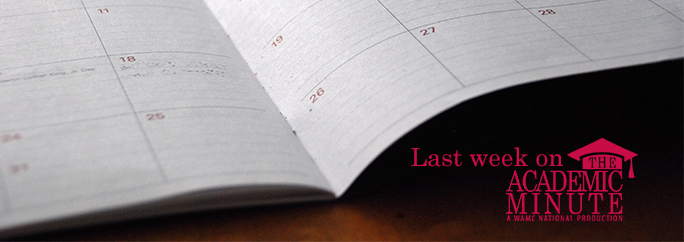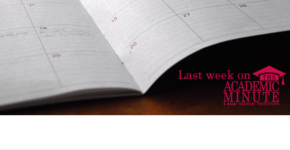
Academic Minute from 7.02 – 7.06
Monday, July 2nd
Robert Edgell – SUNY Polytechnic Institute
Economic Vitality and the Arts
Dr. Edgell is currently an Associate Professor of Technology Management, Co-Director of the Joint Center for Creativity, Design, and Venturing, and had volunteered for one year to be the Interim Dean of the College of Business Management at SUNY Polytechnic Institute. He has been a Visiting Professor at the Swiss Business School in Zurich and has delivered research papers and lectures at Stanford University’s Law School, the University of California San Francisco’s School of Dentistry, the California College of the Arts, and the University of St. Gallen. Previously, he was an Assistant Professor at American University’s Kogod School of Business where he was named Outstanding Faculty. Also, he has taught at San Francisco State University’s College of Business.
Tuesday, July 3rd
Ray Raymond – SUNY Ulster
Avoiding Intelligence Blind Spots
Dr. Ray Raymond is a former British diplomat who held a Post-Doctoral Fellowship at Yale University in American History. He is Associate Professor of Government and History at SUNY Ulster and also teaches government and politics at the United States Military Academy, West Point. In addition, Dr. Raymond is a regular visiting lecturer at the US Air Force Academy and Fellow of the Pell Center for International Relations and Public Policy. He is currently working on a new biography of John Jay as well as a collective biography of five recipients of West Point’s Ninninger Medal, the Academy’s equivalent of the Medal of Honor. Dr. Raymond has been honored by Her Majesty Queen Elizabeth II and by the Chief of Staff of the United States Army for his contribution to the development of the academic program at West Point.
Wednesday, July 4th
Jay Zagorsky – The Ohio State University
Fireworks
Since 1995 I have held the position of Research Scientist at The Ohio State University, where I collect data as part of the National Longitudinal Surveys on income, wealth, and life experiences of thousands of Americans. My personal finance research has been widely quoted in the media and has been highlighted in the Wall Street Journal, USA Today, Fox News, Good Morning America, Scientific American and numerous other news outlets.
Besides publishing numerous scholarly articles I wrote the book “Business Information: Finding and Using Data in the Digital Age” for McGraw-Hill/Irwin and “Business Macroeconomics: A Guide for Managers, Traders and Practical People.” More information on the macroeconomics book can be found at http://businessmacroeconomics.com/.
I also teach at Boston University’s School of Management. From 1988 to the present my teaching has spanned a wide range of levels from senior executives taking intensive classes to high school students encountering economic theories for the first time. I have taught giant lectures of over 450 students, classes of fifty, and small seminars with fewer than ten people.
Thursday, July 5th
Roger Thompson – Stony Brook University
The Last of the Italian Grizzlies
Roger Thompson taught at the Virginia Military Institute for fourteen years, where he was Professor of English and fine arts. His research bridges the traditional disciplinary gaps between rhetoric, literature, and writing studies, and he has worked under fellowship at Harvard University pursuing cross-disciplinary research. He is Senior Fellow at the Institute for Veterans and Military Families at Syracuse University, is the co-recipient of a CCCC Research Initiative Grant, and was invited to the inaugural Dartmouth Summer Seminar for Composition Research. He is an award-winning nonfiction writer, and his scholarship and nonfiction has appeared in numerous academic and non-academic journals. His primary area of research is in the history of rhetoric with a particular emphasis on classical and nineteenth-century rhetoric, but his recent work includes extensive scholarship on veterans and the culture of war. He is co-author of Beyond Duty: Life on the Frontline of Iraq, a bestselling Iraq War memoir that has been translated into several languages and was covered by major media outlets, including The New York Times, CNN, the CBC, and NPR. He has an extensive background in undergraduate research, directing a cross-disciplinary, international environmental research program in Banff, Alberta, for a decade, and his teaching and mentorship was recognized by VMI with several awards and grants. He is senior editor of Don’t Take Pictures magazine, a journal of fine art photography, and he has written extensively about outsider art with publications in Raw Vision and The Outsider. He received his PhD in Rhetoric and American Literature from Texas Christian University, and he received his BA and an MA in English from Baylor University.
Friday, July 6th
Alan Robock – Rutgers University
Geoegineering
Dr. Alan Robock is a Distinguished Professor of climate science in the Department of Environmental Sciences at Rutgers University. He graduated from the University of Wisconsin, Madison, in 1970 with a B.A. in Meteorology, and from the Massachusetts Institute of Technology with an S.M. in 1974 and Ph.D. in 1977, both in Meteorology. Before graduate school, he served as a Peace Corps Volunteer in the Philippines. He was a professor at the University of Maryland, 1977-1997, and the State Climatologist of Maryland, 1991-1997, before coming to Rutgers. Prof. Robock has published 400 articles on his research in the area of climate change, including more than 240 peer-reviewed papers. His areas of expertise include geoengineering, climatic effects of nuclear war, effects of volcanic eruptions on climate, and soil moisture. He serves as Editor of Reviews of Geophysics, the most highly-cited journal in the Earth Sciences. His honors include being a Fellow of the American Geophysical Union, the American Meteorological Society (AMS), and the American Association for the Advancement of Science, and a recipient of the AMS Jule Charney Award. He recently served as a member of the Board of Trustees of the University Corporation for Atmospheric Research, which operates the National Center for Atmospheric Research. Prof. Robock was a Lead Author of the 2013 Working Group 1 Fifth Assessment Report of the Intergovernmental Panel on Climate Change (awarded the Nobel Peace Prize in 2007). In 2017 the International Campaign to Abolish Nuclear Weapons was awarded the Nobel Peace Prize for “for its work to draw attention to the catastrophic humanitarian consequences of any use of nuclear weapons and for its groundbreaking efforts to achieve a treaty-based prohibition of such weapons” based on the work of Prof. Robock.

